ACR102 - Examining Prison Ineffectiveness in Criminal Justice System
VerifiedAdded on 2023/06/07
|7
|2147
|125
Essay
AI Summary
This essay critically examines the ineffectiveness of prisons as correctional institutions, arguing that they often worsen inmates' conditions rather than rehabilitate them. It cites criminological research suggesting that prisons can be 'schools of crime,' where individuals are exposed to and influenced by more severe criminal behaviors. The essay also discusses the high rates of recidivism, particularly in Australia, and explores alternative approaches to punishment, such as rehabilitation and community service. It further highlights the negative impacts of imprisonment on prisoners' mental health and future prospects, advocating for reforms in the criminal justice system to address these issues and reduce crime effectively. This student contributed assignment is available on Desklib, a platform providing study tools and resources for students.
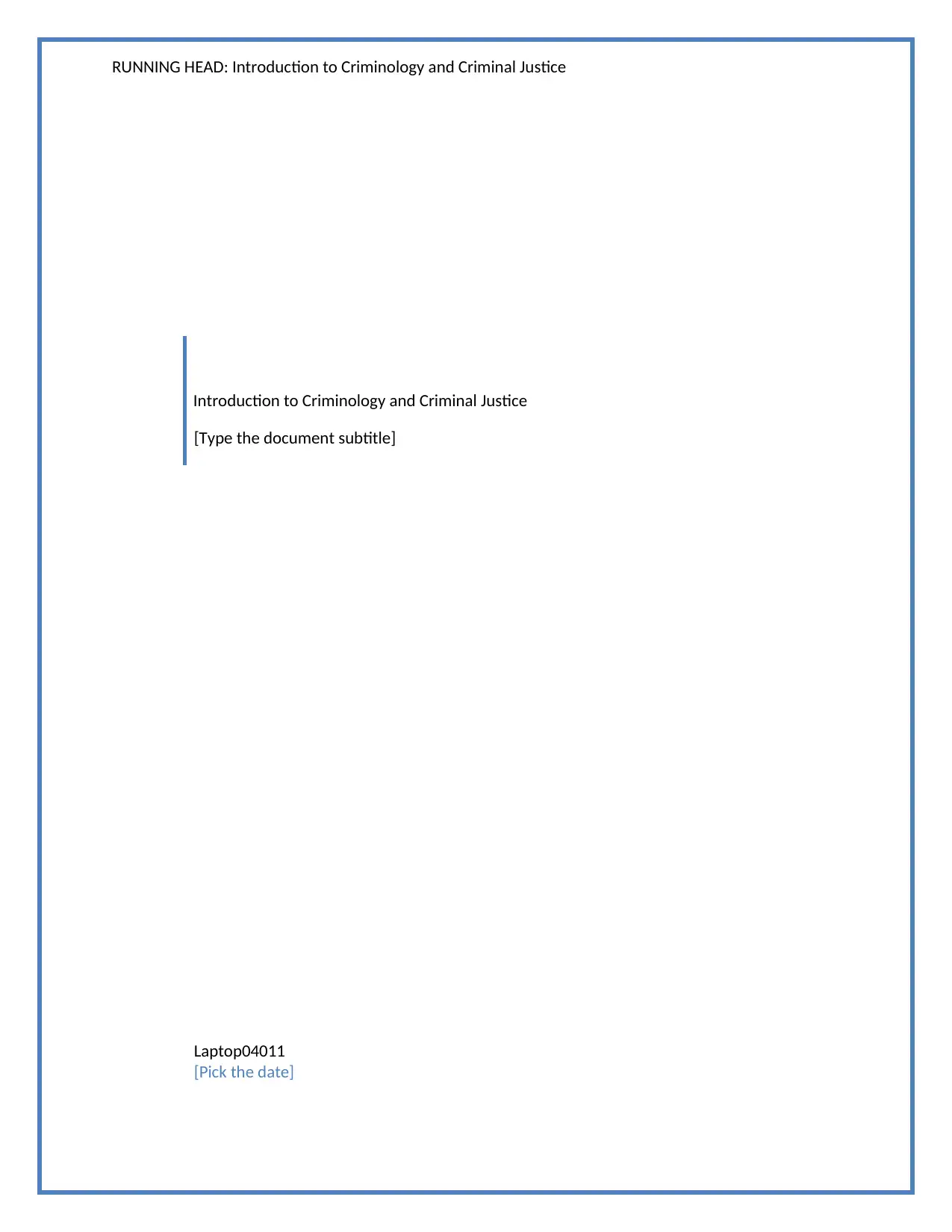
RUNNING HEAD: Introduction to Criminology and Criminal Justice
Introduction to Criminology and Criminal Justice
[Type the document subtitle]
Laptop04011
[Pick the date]
Introduction to Criminology and Criminal Justice
[Type the document subtitle]
Laptop04011
[Pick the date]
Paraphrase This Document
Need a fresh take? Get an instant paraphrase of this document with our AI Paraphraser
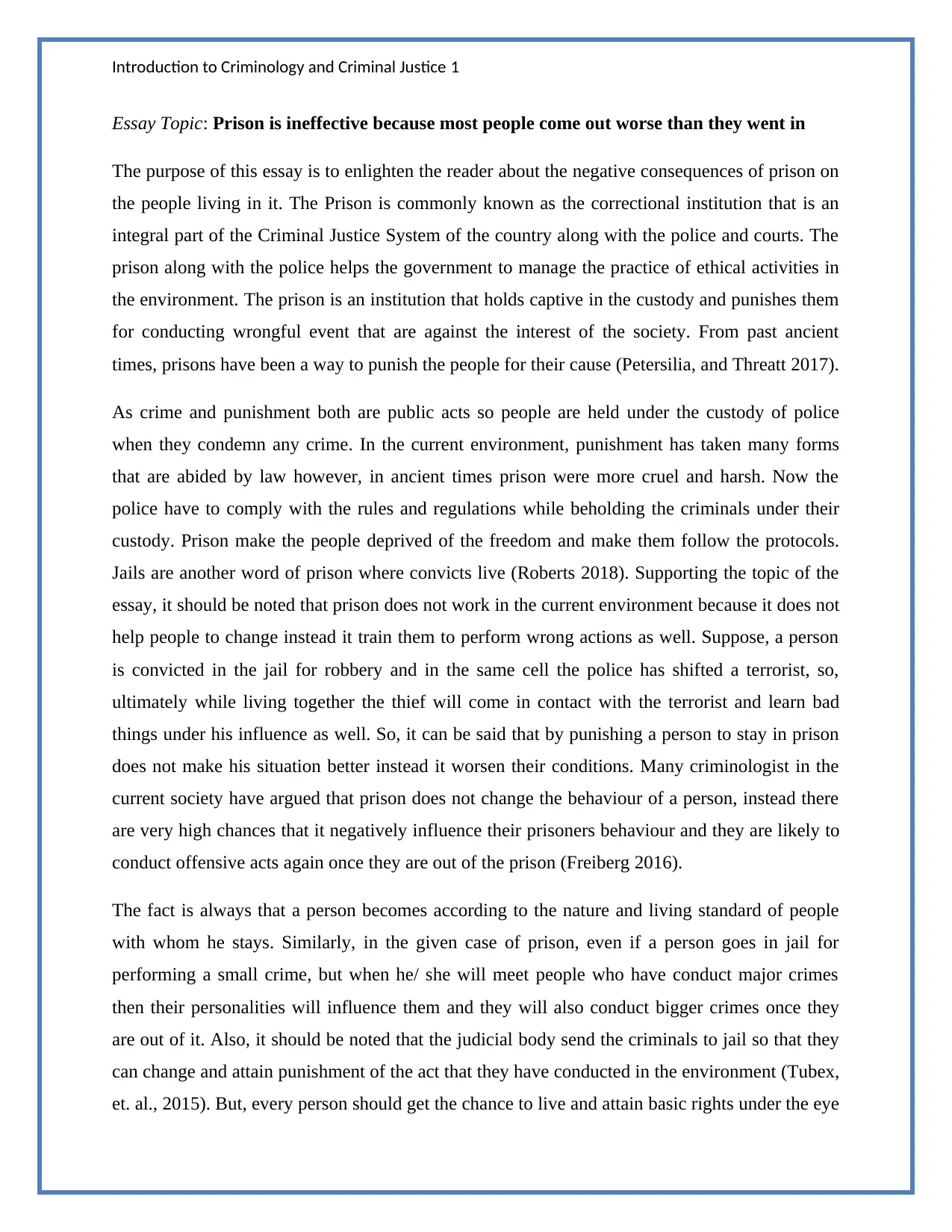
Introduction to Criminology and Criminal Justice 1
Essay Topic: Prison is ineffective because most people come out worse than they went in
The purpose of this essay is to enlighten the reader about the negative consequences of prison on
the people living in it. The Prison is commonly known as the correctional institution that is an
integral part of the Criminal Justice System of the country along with the police and courts. The
prison along with the police helps the government to manage the practice of ethical activities in
the environment. The prison is an institution that holds captive in the custody and punishes them
for conducting wrongful event that are against the interest of the society. From past ancient
times, prisons have been a way to punish the people for their cause (Petersilia, and Threatt 2017).
As crime and punishment both are public acts so people are held under the custody of police
when they condemn any crime. In the current environment, punishment has taken many forms
that are abided by law however, in ancient times prison were more cruel and harsh. Now the
police have to comply with the rules and regulations while beholding the criminals under their
custody. Prison make the people deprived of the freedom and make them follow the protocols.
Jails are another word of prison where convicts live (Roberts 2018). Supporting the topic of the
essay, it should be noted that prison does not work in the current environment because it does not
help people to change instead it train them to perform wrong actions as well. Suppose, a person
is convicted in the jail for robbery and in the same cell the police has shifted a terrorist, so,
ultimately while living together the thief will come in contact with the terrorist and learn bad
things under his influence as well. So, it can be said that by punishing a person to stay in prison
does not make his situation better instead it worsen their conditions. Many criminologist in the
current society have argued that prison does not change the behaviour of a person, instead there
are very high chances that it negatively influence their prisoners behaviour and they are likely to
conduct offensive acts again once they are out of the prison (Freiberg 2016).
The fact is always that a person becomes according to the nature and living standard of people
with whom he stays. Similarly, in the given case of prison, even if a person goes in jail for
performing a small crime, but when he/ she will meet people who have conduct major crimes
then their personalities will influence them and they will also conduct bigger crimes once they
are out of it. Also, it should be noted that the judicial body send the criminals to jail so that they
can change and attain punishment of the act that they have conducted in the environment (Tubex,
et. al., 2015). But, every person should get the chance to live and attain basic rights under the eye
Essay Topic: Prison is ineffective because most people come out worse than they went in
The purpose of this essay is to enlighten the reader about the negative consequences of prison on
the people living in it. The Prison is commonly known as the correctional institution that is an
integral part of the Criminal Justice System of the country along with the police and courts. The
prison along with the police helps the government to manage the practice of ethical activities in
the environment. The prison is an institution that holds captive in the custody and punishes them
for conducting wrongful event that are against the interest of the society. From past ancient
times, prisons have been a way to punish the people for their cause (Petersilia, and Threatt 2017).
As crime and punishment both are public acts so people are held under the custody of police
when they condemn any crime. In the current environment, punishment has taken many forms
that are abided by law however, in ancient times prison were more cruel and harsh. Now the
police have to comply with the rules and regulations while beholding the criminals under their
custody. Prison make the people deprived of the freedom and make them follow the protocols.
Jails are another word of prison where convicts live (Roberts 2018). Supporting the topic of the
essay, it should be noted that prison does not work in the current environment because it does not
help people to change instead it train them to perform wrong actions as well. Suppose, a person
is convicted in the jail for robbery and in the same cell the police has shifted a terrorist, so,
ultimately while living together the thief will come in contact with the terrorist and learn bad
things under his influence as well. So, it can be said that by punishing a person to stay in prison
does not make his situation better instead it worsen their conditions. Many criminologist in the
current society have argued that prison does not change the behaviour of a person, instead there
are very high chances that it negatively influence their prisoners behaviour and they are likely to
conduct offensive acts again once they are out of the prison (Freiberg 2016).
The fact is always that a person becomes according to the nature and living standard of people
with whom he stays. Similarly, in the given case of prison, even if a person goes in jail for
performing a small crime, but when he/ she will meet people who have conduct major crimes
then their personalities will influence them and they will also conduct bigger crimes once they
are out of it. Also, it should be noted that the judicial body send the criminals to jail so that they
can change and attain punishment of the act that they have conducted in the environment (Tubex,
et. al., 2015). But, every person should get the chance to live and attain basic rights under the eye
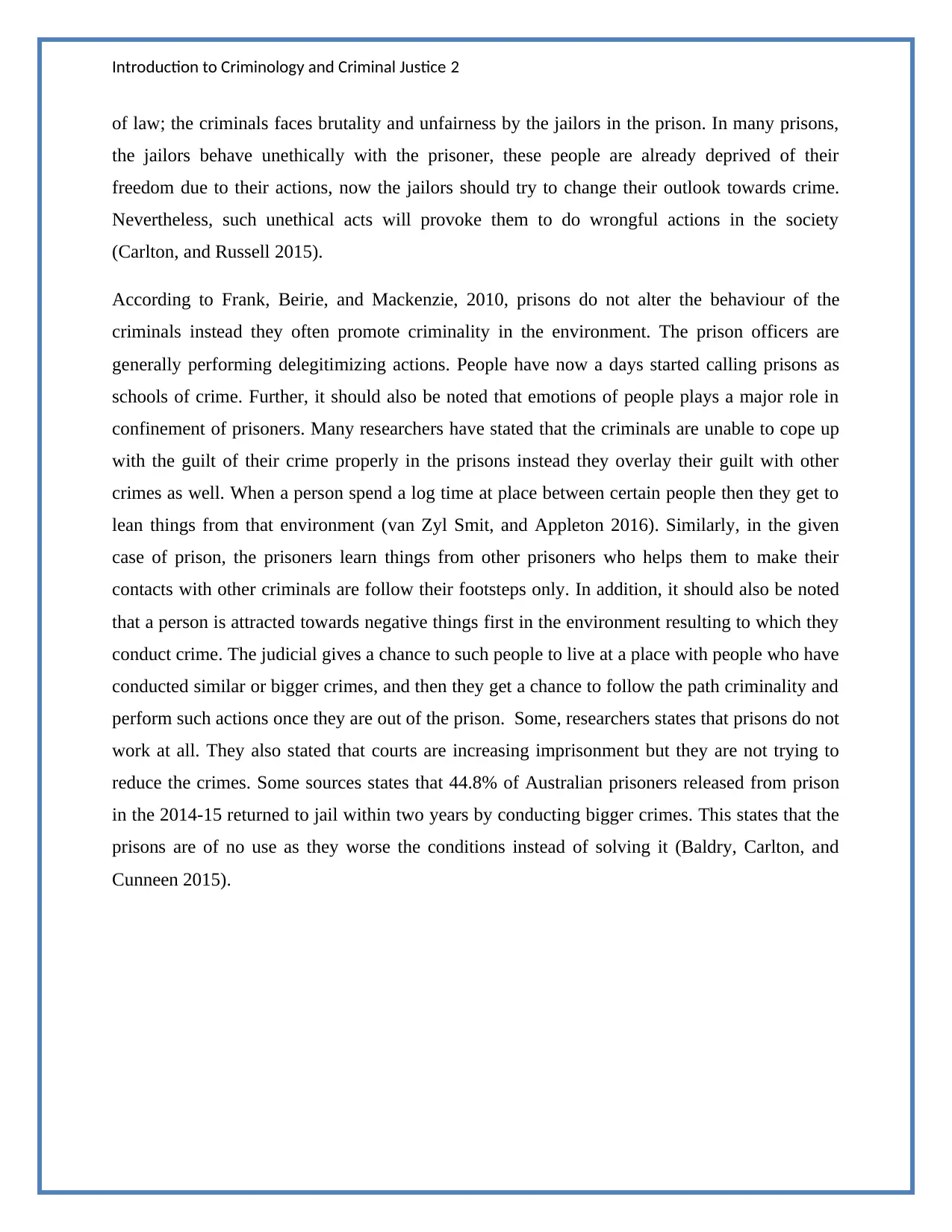
Introduction to Criminology and Criminal Justice 2
of law; the criminals faces brutality and unfairness by the jailors in the prison. In many prisons,
the jailors behave unethically with the prisoner, these people are already deprived of their
freedom due to their actions, now the jailors should try to change their outlook towards crime.
Nevertheless, such unethical acts will provoke them to do wrongful actions in the society
(Carlton, and Russell 2015).
According to Frank, Beirie, and Mackenzie, 2010, prisons do not alter the behaviour of the
criminals instead they often promote criminality in the environment. The prison officers are
generally performing delegitimizing actions. People have now a days started calling prisons as
schools of crime. Further, it should also be noted that emotions of people plays a major role in
confinement of prisoners. Many researchers have stated that the criminals are unable to cope up
with the guilt of their crime properly in the prisons instead they overlay their guilt with other
crimes as well. When a person spend a log time at place between certain people then they get to
lean things from that environment (van Zyl Smit, and Appleton 2016). Similarly, in the given
case of prison, the prisoners learn things from other prisoners who helps them to make their
contacts with other criminals are follow their footsteps only. In addition, it should also be noted
that a person is attracted towards negative things first in the environment resulting to which they
conduct crime. The judicial gives a chance to such people to live at a place with people who have
conducted similar or bigger crimes, and then they get a chance to follow the path criminality and
perform such actions once they are out of the prison. Some, researchers states that prisons do not
work at all. They also stated that courts are increasing imprisonment but they are not trying to
reduce the crimes. Some sources states that 44.8% of Australian prisoners released from prison
in the 2014-15 returned to jail within two years by conducting bigger crimes. This states that the
prisons are of no use as they worse the conditions instead of solving it (Baldry, Carlton, and
Cunneen 2015).
of law; the criminals faces brutality and unfairness by the jailors in the prison. In many prisons,
the jailors behave unethically with the prisoner, these people are already deprived of their
freedom due to their actions, now the jailors should try to change their outlook towards crime.
Nevertheless, such unethical acts will provoke them to do wrongful actions in the society
(Carlton, and Russell 2015).
According to Frank, Beirie, and Mackenzie, 2010, prisons do not alter the behaviour of the
criminals instead they often promote criminality in the environment. The prison officers are
generally performing delegitimizing actions. People have now a days started calling prisons as
schools of crime. Further, it should also be noted that emotions of people plays a major role in
confinement of prisoners. Many researchers have stated that the criminals are unable to cope up
with the guilt of their crime properly in the prisons instead they overlay their guilt with other
crimes as well. When a person spend a log time at place between certain people then they get to
lean things from that environment (van Zyl Smit, and Appleton 2016). Similarly, in the given
case of prison, the prisoners learn things from other prisoners who helps them to make their
contacts with other criminals are follow their footsteps only. In addition, it should also be noted
that a person is attracted towards negative things first in the environment resulting to which they
conduct crime. The judicial gives a chance to such people to live at a place with people who have
conducted similar or bigger crimes, and then they get a chance to follow the path criminality and
perform such actions once they are out of the prison. Some, researchers states that prisons do not
work at all. They also stated that courts are increasing imprisonment but they are not trying to
reduce the crimes. Some sources states that 44.8% of Australian prisoners released from prison
in the 2014-15 returned to jail within two years by conducting bigger crimes. This states that the
prisons are of no use as they worse the conditions instead of solving it (Baldry, Carlton, and
Cunneen 2015).
⊘ This is a preview!⊘
Do you want full access?
Subscribe today to unlock all pages.

Trusted by 1+ million students worldwide
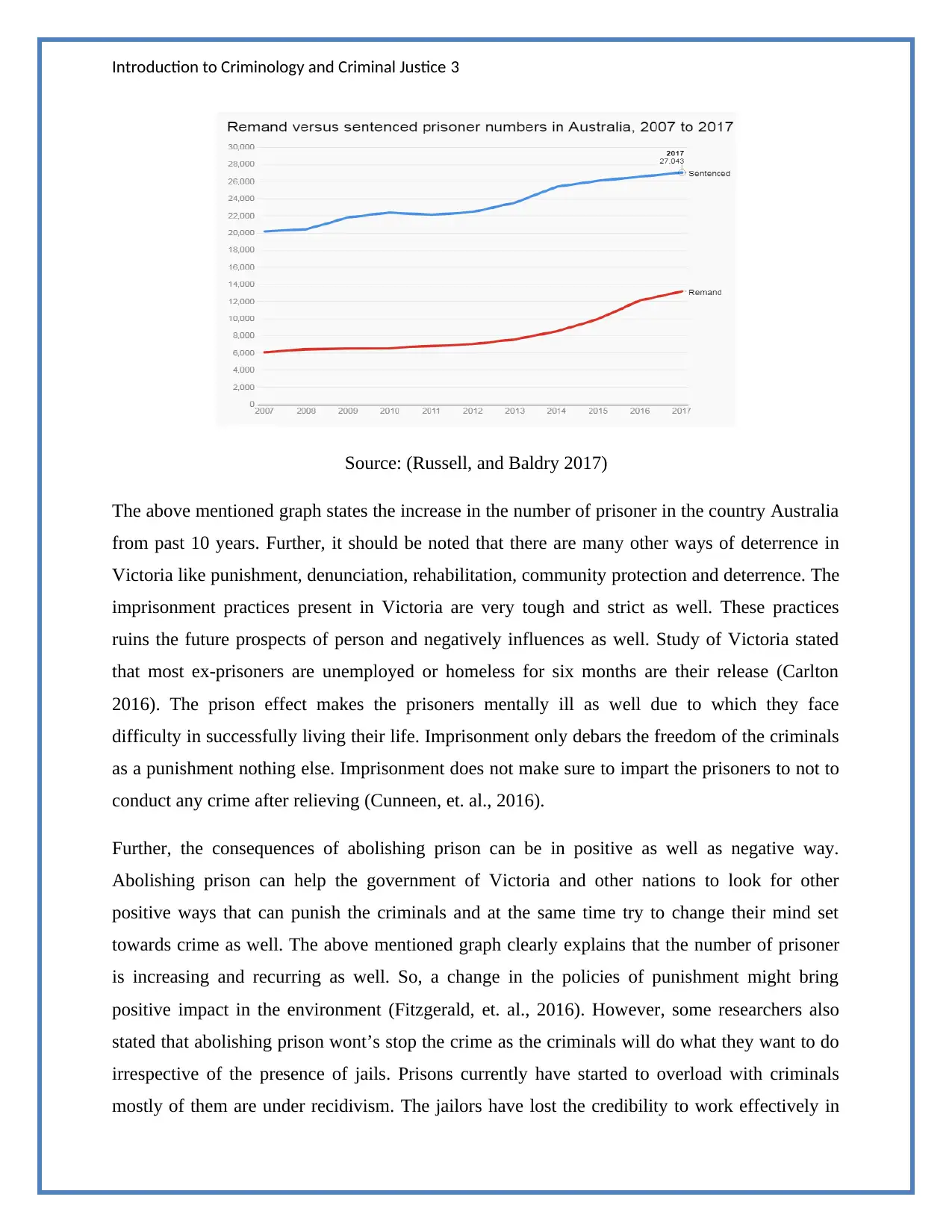
Introduction to Criminology and Criminal Justice 3
Source: (Russell, and Baldry 2017)
The above mentioned graph states the increase in the number of prisoner in the country Australia
from past 10 years. Further, it should be noted that there are many other ways of deterrence in
Victoria like punishment, denunciation, rehabilitation, community protection and deterrence. The
imprisonment practices present in Victoria are very tough and strict as well. These practices
ruins the future prospects of person and negatively influences as well. Study of Victoria stated
that most ex-prisoners are unemployed or homeless for six months are their release (Carlton
2016). The prison effect makes the prisoners mentally ill as well due to which they face
difficulty in successfully living their life. Imprisonment only debars the freedom of the criminals
as a punishment nothing else. Imprisonment does not make sure to impart the prisoners to not to
conduct any crime after relieving (Cunneen, et. al., 2016).
Further, the consequences of abolishing prison can be in positive as well as negative way.
Abolishing prison can help the government of Victoria and other nations to look for other
positive ways that can punish the criminals and at the same time try to change their mind set
towards crime as well. The above mentioned graph clearly explains that the number of prisoner
is increasing and recurring as well. So, a change in the policies of punishment might bring
positive impact in the environment (Fitzgerald, et. al., 2016). However, some researchers also
stated that abolishing prison wont’s stop the crime as the criminals will do what they want to do
irrespective of the presence of jails. Prisons currently have started to overload with criminals
mostly of them are under recidivism. The jailors have lost the credibility to work effectively in
Source: (Russell, and Baldry 2017)
The above mentioned graph states the increase in the number of prisoner in the country Australia
from past 10 years. Further, it should be noted that there are many other ways of deterrence in
Victoria like punishment, denunciation, rehabilitation, community protection and deterrence. The
imprisonment practices present in Victoria are very tough and strict as well. These practices
ruins the future prospects of person and negatively influences as well. Study of Victoria stated
that most ex-prisoners are unemployed or homeless for six months are their release (Carlton
2016). The prison effect makes the prisoners mentally ill as well due to which they face
difficulty in successfully living their life. Imprisonment only debars the freedom of the criminals
as a punishment nothing else. Imprisonment does not make sure to impart the prisoners to not to
conduct any crime after relieving (Cunneen, et. al., 2016).
Further, the consequences of abolishing prison can be in positive as well as negative way.
Abolishing prison can help the government of Victoria and other nations to look for other
positive ways that can punish the criminals and at the same time try to change their mind set
towards crime as well. The above mentioned graph clearly explains that the number of prisoner
is increasing and recurring as well. So, a change in the policies of punishment might bring
positive impact in the environment (Fitzgerald, et. al., 2016). However, some researchers also
stated that abolishing prison wont’s stop the crime as the criminals will do what they want to do
irrespective of the presence of jails. Prisons currently have started to overload with criminals
mostly of them are under recidivism. The jailors have lost the credibility to work effectively in
Paraphrase This Document
Need a fresh take? Get an instant paraphrase of this document with our AI Paraphraser
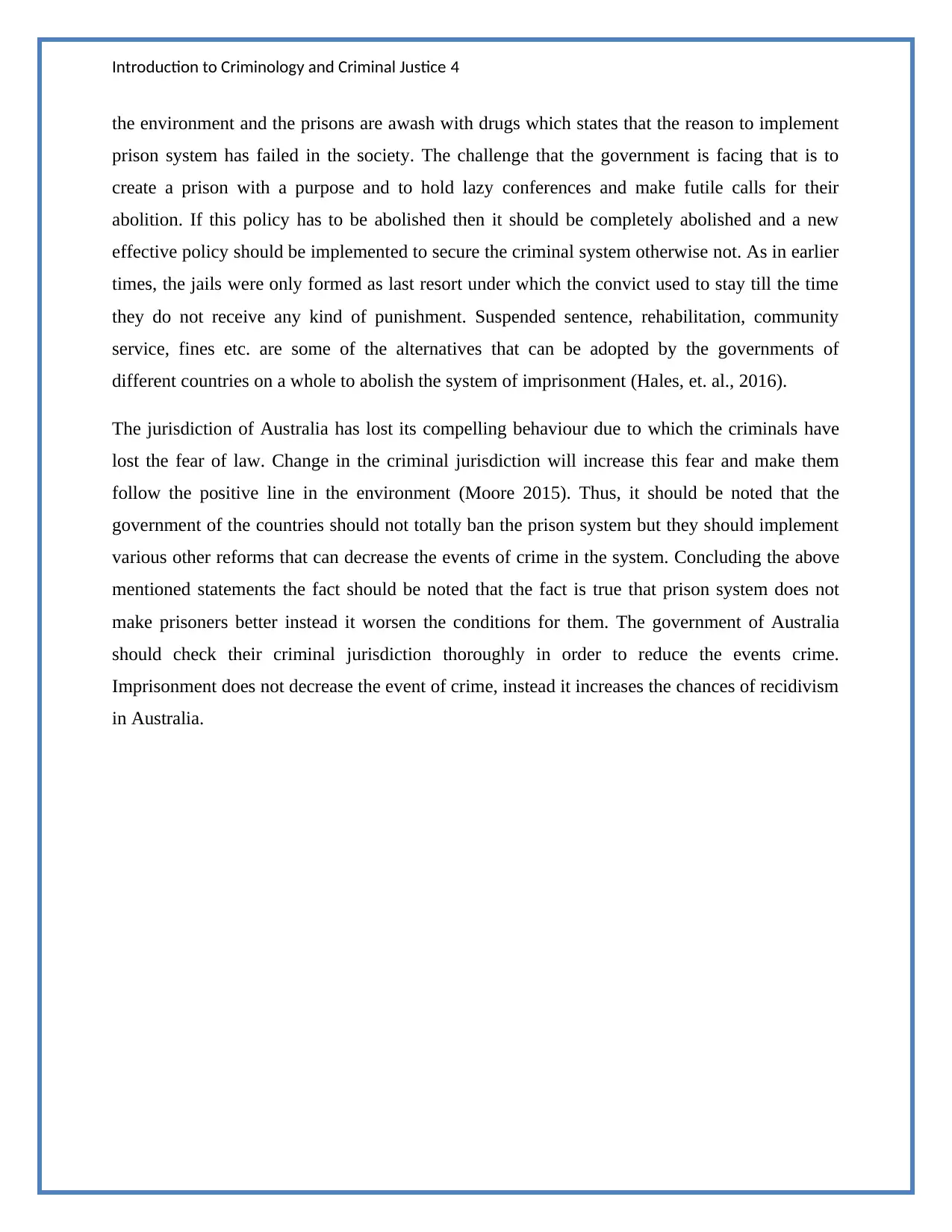
Introduction to Criminology and Criminal Justice 4
the environment and the prisons are awash with drugs which states that the reason to implement
prison system has failed in the society. The challenge that the government is facing that is to
create a prison with a purpose and to hold lazy conferences and make futile calls for their
abolition. If this policy has to be abolished then it should be completely abolished and a new
effective policy should be implemented to secure the criminal system otherwise not. As in earlier
times, the jails were only formed as last resort under which the convict used to stay till the time
they do not receive any kind of punishment. Suspended sentence, rehabilitation, community
service, fines etc. are some of the alternatives that can be adopted by the governments of
different countries on a whole to abolish the system of imprisonment (Hales, et. al., 2016).
The jurisdiction of Australia has lost its compelling behaviour due to which the criminals have
lost the fear of law. Change in the criminal jurisdiction will increase this fear and make them
follow the positive line in the environment (Moore 2015). Thus, it should be noted that the
government of the countries should not totally ban the prison system but they should implement
various other reforms that can decrease the events of crime in the system. Concluding the above
mentioned statements the fact should be noted that the fact is true that prison system does not
make prisoners better instead it worsen the conditions for them. The government of Australia
should check their criminal jurisdiction thoroughly in order to reduce the events crime.
Imprisonment does not decrease the event of crime, instead it increases the chances of recidivism
in Australia.
the environment and the prisons are awash with drugs which states that the reason to implement
prison system has failed in the society. The challenge that the government is facing that is to
create a prison with a purpose and to hold lazy conferences and make futile calls for their
abolition. If this policy has to be abolished then it should be completely abolished and a new
effective policy should be implemented to secure the criminal system otherwise not. As in earlier
times, the jails were only formed as last resort under which the convict used to stay till the time
they do not receive any kind of punishment. Suspended sentence, rehabilitation, community
service, fines etc. are some of the alternatives that can be adopted by the governments of
different countries on a whole to abolish the system of imprisonment (Hales, et. al., 2016).
The jurisdiction of Australia has lost its compelling behaviour due to which the criminals have
lost the fear of law. Change in the criminal jurisdiction will increase this fear and make them
follow the positive line in the environment (Moore 2015). Thus, it should be noted that the
government of the countries should not totally ban the prison system but they should implement
various other reforms that can decrease the events of crime in the system. Concluding the above
mentioned statements the fact should be noted that the fact is true that prison system does not
make prisoners better instead it worsen the conditions for them. The government of Australia
should check their criminal jurisdiction thoroughly in order to reduce the events crime.
Imprisonment does not decrease the event of crime, instead it increases the chances of recidivism
in Australia.
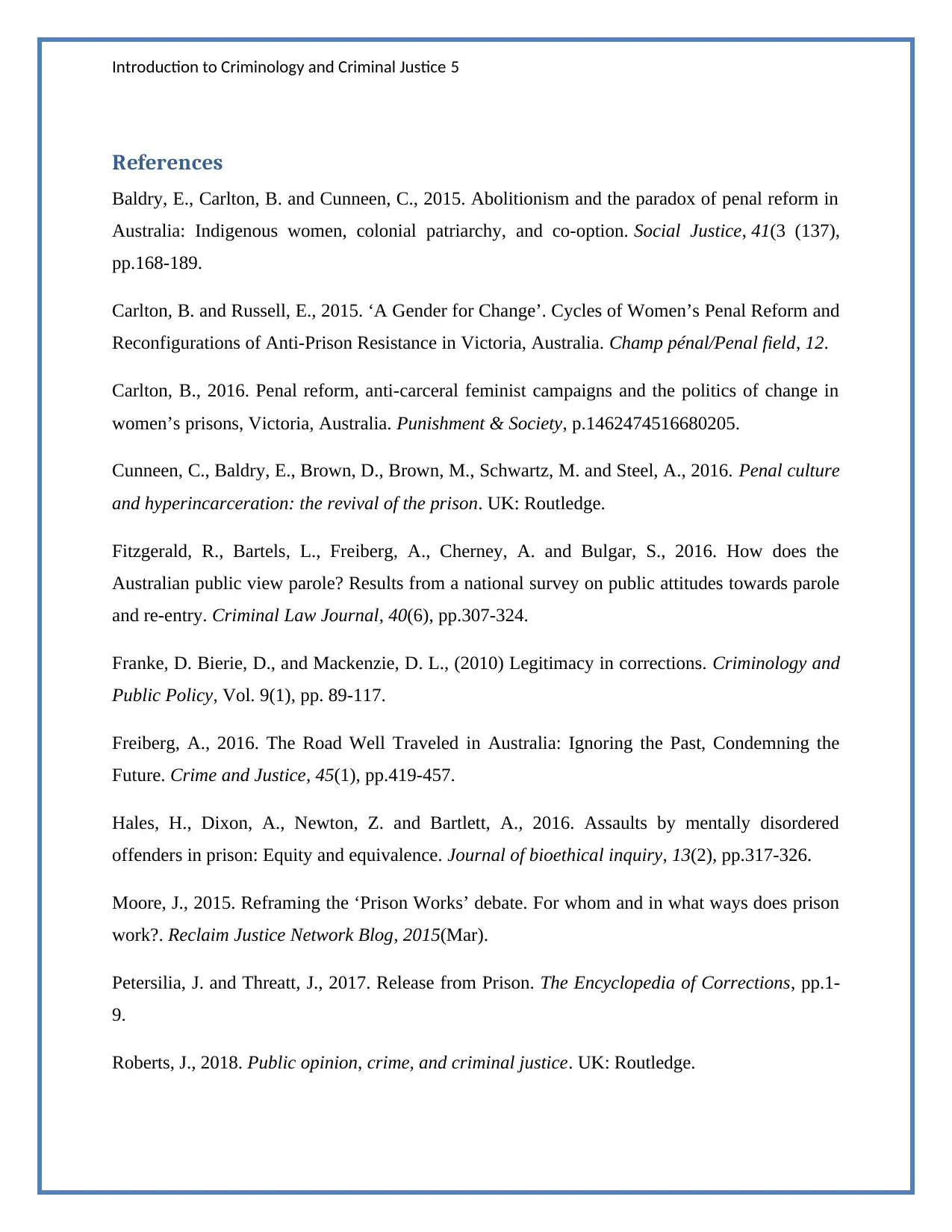
Introduction to Criminology and Criminal Justice 5
References
Baldry, E., Carlton, B. and Cunneen, C., 2015. Abolitionism and the paradox of penal reform in
Australia: Indigenous women, colonial patriarchy, and co-option. Social Justice, 41(3 (137),
pp.168-189.
Carlton, B. and Russell, E., 2015. ‘A Gender for Change’. Cycles of Women’s Penal Reform and
Reconfigurations of Anti-Prison Resistance in Victoria, Australia. Champ pénal/Penal field, 12.
Carlton, B., 2016. Penal reform, anti-carceral feminist campaigns and the politics of change in
women’s prisons, Victoria, Australia. Punishment & Society, p.1462474516680205.
Cunneen, C., Baldry, E., Brown, D., Brown, M., Schwartz, M. and Steel, A., 2016. Penal culture
and hyperincarceration: the revival of the prison. UK: Routledge.
Fitzgerald, R., Bartels, L., Freiberg, A., Cherney, A. and Bulgar, S., 2016. How does the
Australian public view parole? Results from a national survey on public attitudes towards parole
and re-entry. Criminal Law Journal, 40(6), pp.307-324.
Franke, D. Bierie, D., and Mackenzie, D. L., (2010) Legitimacy in corrections. Criminology and
Public Policy, Vol. 9(1), pp. 89-117.
Freiberg, A., 2016. The Road Well Traveled in Australia: Ignoring the Past, Condemning the
Future. Crime and Justice, 45(1), pp.419-457.
Hales, H., Dixon, A., Newton, Z. and Bartlett, A., 2016. Assaults by mentally disordered
offenders in prison: Equity and equivalence. Journal of bioethical inquiry, 13(2), pp.317-326.
Moore, J., 2015. Reframing the ‘Prison Works’ debate. For whom and in what ways does prison
work?. Reclaim Justice Network Blog, 2015(Mar).
Petersilia, J. and Threatt, J., 2017. Release from Prison. The Encyclopedia of Corrections, pp.1-
9.
Roberts, J., 2018. Public opinion, crime, and criminal justice. UK: Routledge.
References
Baldry, E., Carlton, B. and Cunneen, C., 2015. Abolitionism and the paradox of penal reform in
Australia: Indigenous women, colonial patriarchy, and co-option. Social Justice, 41(3 (137),
pp.168-189.
Carlton, B. and Russell, E., 2015. ‘A Gender for Change’. Cycles of Women’s Penal Reform and
Reconfigurations of Anti-Prison Resistance in Victoria, Australia. Champ pénal/Penal field, 12.
Carlton, B., 2016. Penal reform, anti-carceral feminist campaigns and the politics of change in
women’s prisons, Victoria, Australia. Punishment & Society, p.1462474516680205.
Cunneen, C., Baldry, E., Brown, D., Brown, M., Schwartz, M. and Steel, A., 2016. Penal culture
and hyperincarceration: the revival of the prison. UK: Routledge.
Fitzgerald, R., Bartels, L., Freiberg, A., Cherney, A. and Bulgar, S., 2016. How does the
Australian public view parole? Results from a national survey on public attitudes towards parole
and re-entry. Criminal Law Journal, 40(6), pp.307-324.
Franke, D. Bierie, D., and Mackenzie, D. L., (2010) Legitimacy in corrections. Criminology and
Public Policy, Vol. 9(1), pp. 89-117.
Freiberg, A., 2016. The Road Well Traveled in Australia: Ignoring the Past, Condemning the
Future. Crime and Justice, 45(1), pp.419-457.
Hales, H., Dixon, A., Newton, Z. and Bartlett, A., 2016. Assaults by mentally disordered
offenders in prison: Equity and equivalence. Journal of bioethical inquiry, 13(2), pp.317-326.
Moore, J., 2015. Reframing the ‘Prison Works’ debate. For whom and in what ways does prison
work?. Reclaim Justice Network Blog, 2015(Mar).
Petersilia, J. and Threatt, J., 2017. Release from Prison. The Encyclopedia of Corrections, pp.1-
9.
Roberts, J., 2018. Public opinion, crime, and criminal justice. UK: Routledge.
⊘ This is a preview!⊘
Do you want full access?
Subscribe today to unlock all pages.

Trusted by 1+ million students worldwide
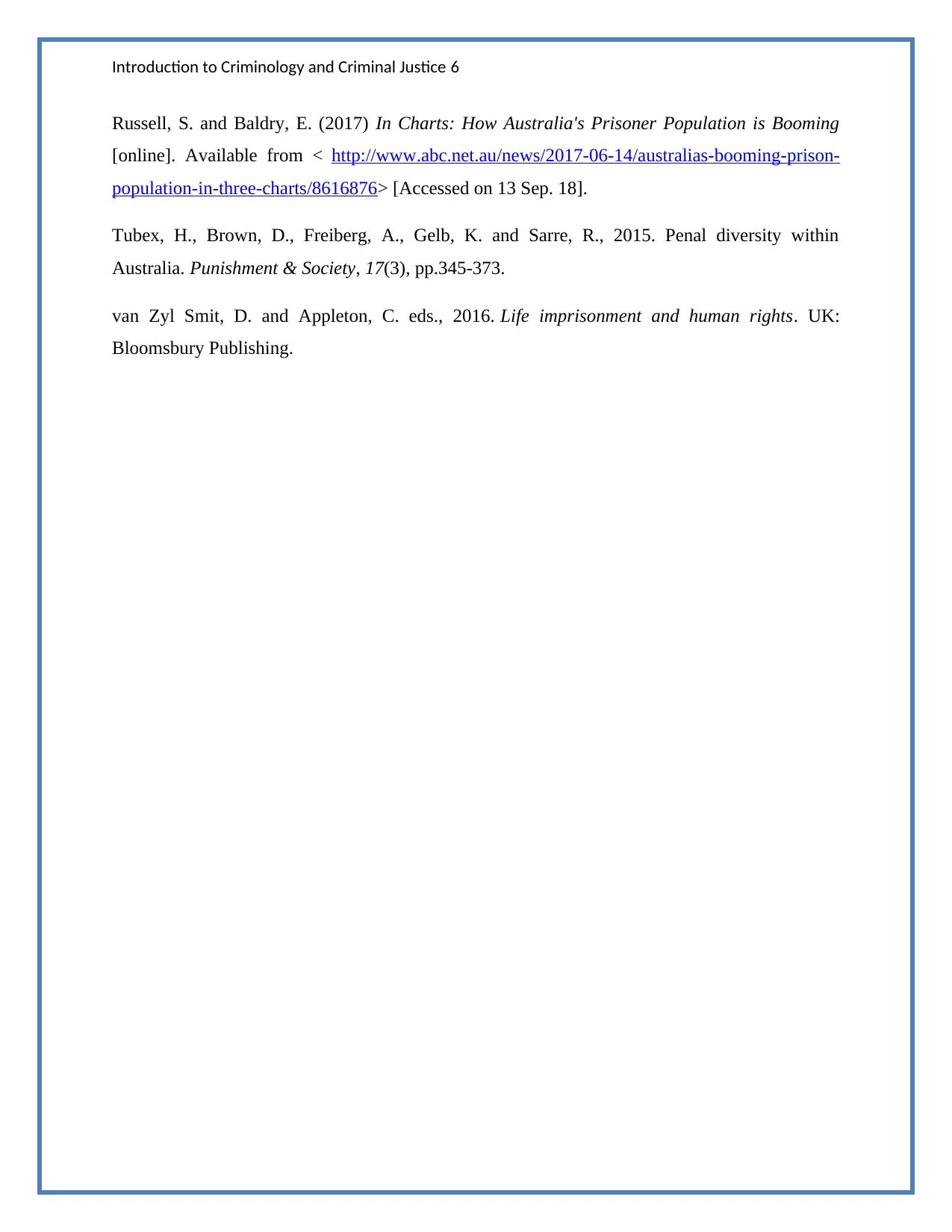
Introduction to Criminology and Criminal Justice 6
Russell, S. and Baldry, E. (2017) In Charts: How Australia's Prisoner Population is Booming
[online]. Available from < http://www.abc.net.au/news/2017-06-14/australias-booming-prison-
population-in-three-charts/8616876> [Accessed on 13 Sep. 18].
Tubex, H., Brown, D., Freiberg, A., Gelb, K. and Sarre, R., 2015. Penal diversity within
Australia. Punishment & Society, 17(3), pp.345-373.
van Zyl Smit, D. and Appleton, C. eds., 2016. Life imprisonment and human rights. UK:
Bloomsbury Publishing.
Russell, S. and Baldry, E. (2017) In Charts: How Australia's Prisoner Population is Booming
[online]. Available from < http://www.abc.net.au/news/2017-06-14/australias-booming-prison-
population-in-three-charts/8616876> [Accessed on 13 Sep. 18].
Tubex, H., Brown, D., Freiberg, A., Gelb, K. and Sarre, R., 2015. Penal diversity within
Australia. Punishment & Society, 17(3), pp.345-373.
van Zyl Smit, D. and Appleton, C. eds., 2016. Life imprisonment and human rights. UK:
Bloomsbury Publishing.
1 out of 7
Related Documents
Your All-in-One AI-Powered Toolkit for Academic Success.
+13062052269
info@desklib.com
Available 24*7 on WhatsApp / Email
![[object Object]](/_next/static/media/star-bottom.7253800d.svg)
Unlock your academic potential
Copyright © 2020–2026 A2Z Services. All Rights Reserved. Developed and managed by ZUCOL.





